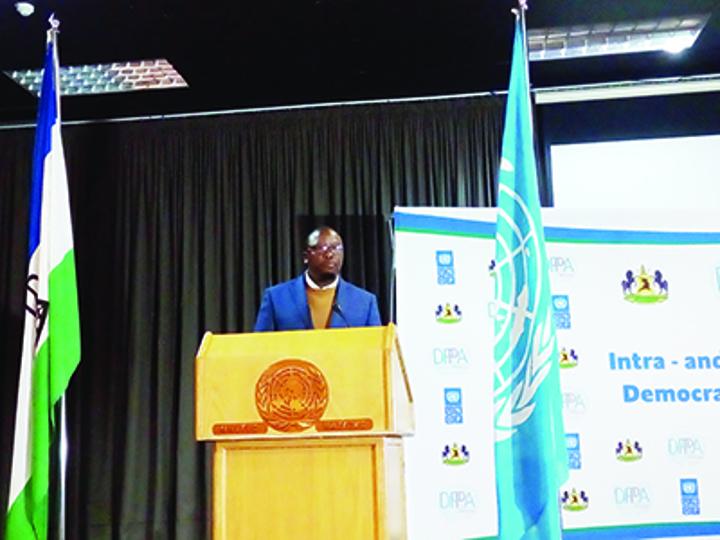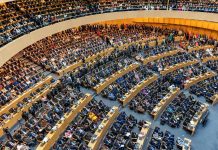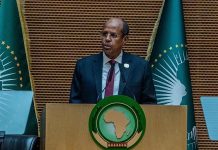Africa-Press – Lesotho. The political instability that has bedevilled the country has been attributed largely to the political party coalitions, the Intra-and-Inter-Party Democracy
in Lesotho assessment report that was launched Thursday last week by the Prime Minister Dr Moeketsi Majoro has revealed. This publication which is commissioned by the United Nations Development Programme
(UNDP) as represented by the Resident Representative Ms. Betty Wabunoha to
“gain a better understanding of the factors that impact on the proper functioning of political parties” and the findings of the report will be used
to “inform various interventions” of the United Nations (UN) together with its Lesotho based agencies. “The overarching aim of the assessment on Intra-and –Inter-Party Democracy in
Lesotho was to provide the empirical evidence on the functioning of political parties and impact of coalitions on socio-economic development cohesion in
Lesotho,” reads the report. The report has established that there “is consensus among interlocutors that the political party coalitions have been a source of Lesotho’s political
instability”. It further says: “The perverse incentives in the formation of political parties has led to a multiplicity of parties further crowding the field and
exacerbating conflict, with poverty fuelling the situation as young Basotho see politics as the only viable option for livelihood”. The assessment adds that the coalition formations have not been on account of
ideology and “alignment around core agenda” rather on the “political interest and convenience and the impulsive urge to settle political scores”. The leading researcher of this assessment study Dr Victor Shale of the Shalestone
Elections and Governance Consultants (PTY) Ltd at the launch of this report last week on Thursday said the political parties are public institutions and
should be held accountable as they are contesting for power. Lesotho first had coalition dispensations from 2012 owing to no outright majority winner in the general elections and the trend has continued to date.
Since then, all the coalitions have not enjoyed the full term in government as they ended up dying prematurely, causing the country to go for snap elections.
Last year saw the end of road for the then coalition government which was made of four parties and famously known as 4*4 when it made a way for the current
coalition administration led by two main parties, in partnership with five other parties, now four after one left the alliance. One of the respondents of the assessment has been quoted as saying; “When the whole
world was seized with the novel COVID-19 crisis, the priority in Lesotho was to get rid of the Prime Minister. Parliament was opened at the height of the
pandemic and with inadequate measures to prevent the pandemic. Lesotho now faces (sic) a threat of losing out on the Millennium Challenge Corporation [MCC] just
like during the 2015-2017 coalition then led by [Pakalitha] Mosisili. “During that time, the United States threatened to withhold the renewal of the MCC.
The European Union also suspended its budget support over Mosisili’s reluctance to remove the then LDF [Lesotho Defence Force] Commander and address human rights
violations. Now since 2017, the pressing demands on Lesotho are the successful implementation of national reforms and need to stop police brutality. But as
usual, the political elite is busy fighting factional battles and oblivious to the crisis facing the country’s economy ahead”. The study found that the coalition formations have “eroded” intra-party democracy and
intensified inter-party tensions “due to resentment, deep-seated fear, suspicion and serious distrust amongst politicians”. Also, partisanship and lack of service delivery have been attributed to the strains
within the communities. According to the assessment, the local political parties are characterised by the “leader centeredness, lack of effective governance rules or failure to enforce
governance” phenomena. It goes on to posit that; “These include lack of ideological and policy clarities, lack of internal regulations, lack of elaborate institutional structures that are essential for political party
functioning. ” “They have a glaring deficit on gender mainstreaming and representation of vulnerable groups, including youth PWDs [People with disabilities] in leadership
positions. These shortcomings are a major reason for the weak intra-party democracy in Lesotho. “Within parties, National Executive Committees (NECs) are bestowed with the
responsibility to make decisions on the day to day operations of the parties. Yet they are visibly not adequately trained in the management of organisations,” the report has said.
It goes on to highlight that the political parties lack alternative dispute resolutions tools like mediation, negotiation and conciliation before exhausting legal avenues which “don’t deal with the causes but the symptoms of
the disputes”. The study also found that the political parties lack resource mobilisation and management of human, financial and infrastructure resources for the sustenance
of their operations adding that the challenge on their part is “lack of accountability”. To buttress the challenges that have overwhelmed the parties, the study suggests
what it says, “a need for rethinking the current support of political parties that only focuses on them as institutions”. It further introduces a people focused approach over the leader centeredness, one
previously alluded. “In this way, the quality of political parties will be enhanced over quantity so that their intra-and-inter-party democracy is improved.
The assessment assumes a trickledown effect where strong, viable political parties will contribute to the strengthening of social cohesion”. The assessment recommends the political party
legislation which will oversee the following: formation, management, conduct, funding, and de-registration of parties and coalitions. Further, the assessment
mentions the need for an abolishment of floor crossing in parliament “so that it does not usurp the power from the electorate and, strengthen provisions
pertaining to party coalitions so that their formation, management and accountability are clearly expressed”. The other recommendation is that there should be mounting of political parties
focused statutory body, a move the assessment deems will “create a distinct separation of roles” between such an organ and the Independence Electoral Commission
(IEC) so that the latter’s attention is directed towards the management and
administration of electoral processes. To address the capacity gaps within the parties, the assessment suggests a curriculum which will focus on the trainings in the following areas: party
systems, party organisation and management leadership development and leadership skills; policy development and implementation; gender mainstreaming and inclusivity; peacebuilding and conflict management skills; coalition
building, leadership and management skills, social mobilisation skills; communication skills; recruitment strategies and membership record keeping and
maintenance. The report further added that the curriculum be tailored to capacitate marginalised groups that include women, youth and PDWs. “The curriculum must include public speaking, debating, election campaign and
planning, campaign strategies, resource mobilisation and leadership training skills,” the assessment reads. Taking stock of the assessment findings, the Member of Parliament (MP)
‘Matlhohonolofatso Tšepang Tšita-Mosena said there is a lot which needs to be
done as far as there is party democracy in the country. She further said within the coalition setting, when the parties do not see eye to eye that causes the “disjuncture”, a grey line between intra and inter party
democracy as each party exercises its own right within the coalition which can be compromised if there are disagreements. Mosena alleged that the coalition dispensations work on “persona” basis adding that
the parties idolise the leaders. “We need to look at the political parties as led by a collective rather than individuals. ” She further charged that; “There
should not be a disjoint between what the leader portrays and how followers align with the party,” adding that if leaders fail to live up to the promises
they make, people should not align with such calibre of leaders. In what she terms as the “root” problem that the country finds itself in, she said that is perpetuated by the funders who have ulterior motives and through means
which are not accounted for, thereby commanding undue influence within the parties, especially when they form government. Parties should be “careful” whom
to bring on board and what is expected of them as funders to avoid blurred lines. Reacting to the report was also the Executive Director of the Lesotho Council of
Non-Governmental Organisations (LCN) Seabata Motsamai said the majority of political parties fall short of complying with the Law Office stipulations further alleging that most of the parties fail to hold their Annual General
Meetings (AGMs) within the confined timeframes. The Executive Director said if the parties default on their obligations, the moral “deficit” will grow.
Motsamai further mentioned that for the democracy to grow, the parties ought to be accountable adding that they have to govern themselves well on their path to
assume the national governance. “Very unfortunately the coalitions are based in personalities,” he argued. Also forming the panel of the discussants were the political science lecturer at the
National University of Lesotho Dr Tlohang Letsie and Liphaphang Monesa from faith based organizations who dissected the other assessment which was launched on the same day also
commissioned by the UNDP, ‘Understanding Conflict, Peace and Gender Contexts in Lesotho’. The UNDP has instigated a Country Programme (2019-2023), which has three focal
areas: governance, accountability, social cohesion and stability, sustainable and inclusive economic growth and environmental sustainability, climate change
and resilience. The assessment was also borne out of the UNDP’s “flagship” programme on Renewal and Enhancement of Governance Architecture (PREGA) 2019-2023 which saw the mounting of the ‘Support to Conflict, Prevention, Party Democracy and Consensus Building in Lesotho’ project.






